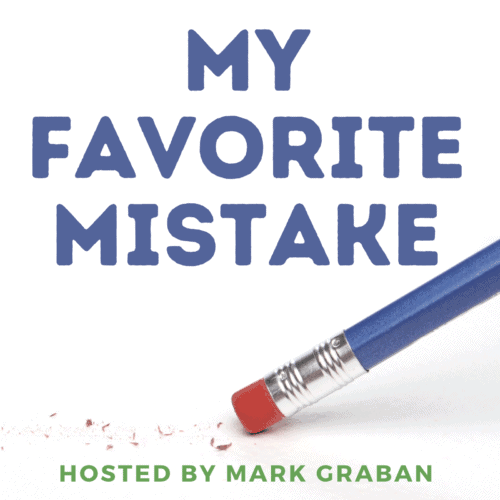I make mistakes all the time. I do try to make sure I learn from them instead of repeating them over and over. Learning from small mistakes and help prevent big mistakes — I think that's true in the workplace and in our daily lives.
This topic is fascinating to me, which is why I started a new podcast series called “My Favorite Mistake.”
In the first four episodes, we've heard stories about learning from mistakes.
In episode #1, Kevin Harrington (“Shark Tank”) shared a mistake about how he had all of his infomercial products in the same merchant account and how quality problems with one product threatened his cash flow for his entire business. He and Mark Timm shared some common mistakes from the realm of mentoring, as well.
In episode #2, Congressman Will Hurd (R-TX) shared some strategic and tactical mistakes that he made when he ran for Congress the first time and lost. He didn't blame others. He owned the mistakes, took responsibility, learned, and did better (winning three times).
Episode #3 featured Karyn Ross sharing a story about losing her suitcase in an airport. That story seems simple, but it sparked a lot of conversation about learning from mistakes and being kind to ourselves when we make them.
And the most recent episode #4 has Jim Benson sharing a mistake he made in how he assessed a situation (and the people) at a client some years ago. Like the others, he reflected and learned from that mistake.
Episode #5 features Billy Taylor talking about his favorite mistake from his early days as a manufacturing leader and how that helped shape the rest of his successful career.
Some say it's almost cliché to say things like “we learn from mistakes” or “our best learning comes through mistakes.” There is some science to back that up.
This 2007 article has a summary of some recent research:
Study Reveals Why We Learn From Mistakes
Scientists have long known that mistakes are conducive to learning, suggesting the reason lies in the element of surprise upon finding out we are wrong. But how the brain manages to learn from mistakes and how quickly it does so have been unknowns.”
In the study, people were asked to make predictions — and that's exactly what we do when improving through Lean methods. We make an informed prediction, we form a hypothesis about what we expect to happen when we make a change to a system.
The researchers, while monitoring brain scans, then introduced new information that made the previous prediction incorrect — again that happens when we are testing changes in our Plan Do Study Adjust cycles.
It seems that the process of learning through a mistake is faster than conscious higher-level thought:
“Activity increased immediately after the individual saw the new information flash onto the computer screen–within 0.1 seconds–before there was time for any conscious consideration.”
Here is the full article (and the direct PDF link is here):
Predictive learning, prediction errors, and attention: evidence from event-related potentials and eye tracking
The top-level summary is very interesting:
“Prediction error (“surprise”) affects the rate of learning: We learn more rapidly about cues for which we initially make incorrect predictions than cues for which our initial predictions are correct.”
Take that in again for a second… being surprised (oh, we were wrong!) leads to more learning. We learn more from incorrect predictions than we learn from the times we are correct. Fascinating.
What mistakes are you going to learn from today? I guess that question is asking you to make a prediction. It's more likely that you'll be surprised by the mistakes you make… and hopefully that leads to learning instead of the repeating of the mistake down the road.
I'm reminded of a quote that I had posted years ago… making mistakes is better than faking perfection.

Please scroll down (or click) to post a comment. Connect with me on LinkedIn.
Let’s work together to build a culture of continuous improvement and psychological safety. If you're a leader looking to create lasting change—not just projects—I help organizations:
- Engage people at all levels in sustainable improvement
- Shift from fear of mistakes to learning from them
- Apply Lean thinking in practical, people-centered ways
Interested in coaching or a keynote talk? Let’s start a conversation.





![When Was the Last Time a Leader Around You Admitted They Were Wrong? [Poll]](https://www.leanblog.org/wp-content/uploads/2025/07/Lean-Blog-Post-Cover-Image-2025-07-01T212509.843-238x178.jpg)


![When Was the Last Time a Leader Around You Admitted They Were Wrong? [Poll]](https://www.leanblog.org/wp-content/uploads/2025/07/Lean-Blog-Post-Cover-Image-2025-07-01T212509.843-100x75.jpg)


Hi Mark! As a senior in college I think this article is important for many reason. I am very hard on myself and when I make a mistake (big or small) it takes me a while to find my groove again. I feel that I let people down who are counting on me. I have learned from many mistakes and learned that it is normal not to be perfect. It is very interesting that on your podcasts, many highly recognized professionals share experiences about the mistakes they have made. Even the most successful people make mistakes too! Since I am graduating and going into the supply chain workforce soon, it is important to take this information with me as I move along in the world. Everyone makes mistakes, but it is about how you learn from them that makes the difference! Thank you for sharing this post, I am definitely going to save this and share with fellow colleagues and peers!
Thanks for sharing your reflections, Jenna. You’ll definitely appreciate Episode #4 with Karyn Ross, where she talks about being kind toward yourself when you make a mistake: http://markgraban.com/mistake4
Hi Mark. I really enjoyed this post and I have been enjoying listening to your My Favorite Mistake series these past weeks. The quote “Making mistakes is better than perfection” really speaks to me on both a personal and work level. I recently started a new position at my company and, while I sometimes am hard on myself for little everyday mistakes I make, I do try to step back and evaluate these types of things as I go that I can learn from. Just the other day, I sent a file to the wrong person, but instead of beating myself up over the mistake, I followed up with an email and a phone call to fix the miscommunication. I can say that I definitely have learned from that mistake and won’t be making it again!
Really good blog, I really liked this quote “Activity increased immediately after the individual saw the new information flash onto the computer screen–within 0.1 seconds–before there was time for any conscious consideration.” I thought this was really eye opening and found it fascinating. I agree with the main statement of learning from our mistakes and not making them again. I look forward to reading more of your blog posts.
[…] insights from this research are important for more than just school learning22. Scientists are looking into how learning from […]